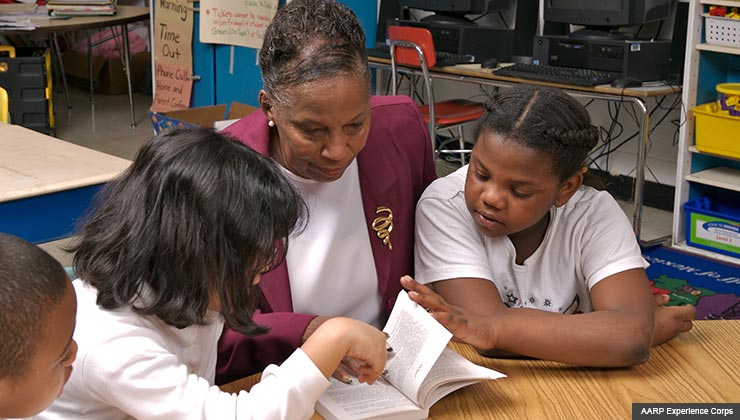Research Studies
AARP Foundation Experience Corps is an evidence-based intervention. Research results include findings from independent, rigorous studies conducted by Washington University/Mathematica Policy Research and Johns Hopkins University.
Washington University of St. Louis/Mathematica Policy Research used a random assignment, experimental design to measure outcomes of more than 800 first-, second- and third-grade students at 23 urban schools in three cities and found:
- Improved literacy skills: 60 percent greater gains in two critical literacy skills, sounding out new words and reading comprehension.
- Classroom impact: Students with Experience Corps tutors get a boost in reading skills equivalent to the boost they would get from being assigned to a classroom with 40 percent fewer children.
Johns Hopkins University used a quasi-experimental design to measure outcomes of 1,194 children in grades K–3 from six urban elementary schools and found:
- Better test scores: Third-graders scored significantly higher on a reading test, the Maryland School Performance Assessment Program, than children in the control schools.
- Better behavior: In schools with Experience Corps, referrals to the principal for classroom misbehavior decreased by half; referrals in other schools remained about the same.
- Teacher approval: Teachers and principals reported high satisfaction with Experience Corps.
Washington University researchers document AARP Foundation Experience Corps impact
Washington University researchers document impact of AARP Experience Corps tutors on student progress and benefits of Experience Corps for tutors.
- Read the latest research from Literacy Research and Instruction
- Read the latest research from Education and Urban Society
- Read the full report on student impact
- Brief — The Volunteer Experience
- Brief — Methodology of Member Outcomes Study
- Brief — Experience Corps: Who Are the Members?
- Brief — Experience Corps: Changes in Activity Associated with Participation
Johns Hopkins University researchers document AARP Experience Corps impact
Students earn significantly higher test scores while tutors realize improvements in mental and physical health. Results point to cost-effective "win-win" for students, schools and community.
- Short-Term Impact of Experience Corps Participation on Children and Schools — Journal of Urban Health, 2004
- Health outcomes of ExperienceCorps: A high-commitment volunteer program — Journal of Social Sciences and Medicine, 2010
- Marketing Public Health Through Older Adult Volunteering — the American Journal of Public Health, 2010
- Evidence for Neurocognitive Plasticity in At-Risk Older Adults: The Experience Corps Programs — Journal of Gerontology: Medical Sciences, 2009
- Volunteering: A Physical Activity Intervention for Older Adults — the Journal of Urban Health, 2006
- A Social Model for Health Promotion for an Aging Population — the Journal of Urban Health, 2004
Experience Corps in Urban Elementary Schools: A Survey of Principals
AARP Experience Corps boosts student academic achievement, according to an independent survey by Policy Studies Associates, and principals welcome the program into their schools. "Principals, coping with the press of ever-rising academic expectations and administrative challenges, have no time for programs that do not serve their purposes," notes the report. "Experience Corps has won their allegiance and respect." Read the full report from Policy Studies Associates.
Volunteer
AARP Foundation Experience Corps is looking for adults 50 years and older interested in tutoring K-3 students who are struggling to read.
Is Experience Corps in my city?
AARP Foundation Experience Corps has more than 2,300 highly-trained volunteers working in 22 cities and serves over 9,600 students every year in high-need elementary schools.
Find My CityDonate
Donate to AARP Foundation Experience Corps. Your generous support will bring experience to life.




